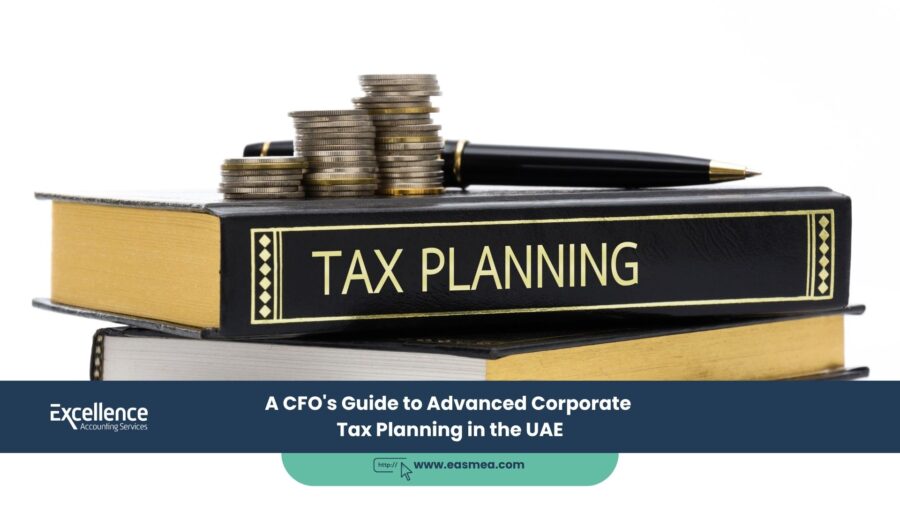A CFO’s Guide to Advanced Corporate Tax Planning in the UAE
With the introduction of Corporate Tax, the role of the Chief Financial Officer (CFO) in the UAE has fundamentally evolved. Basic compliance—filing returns and paying the correct amount of tax—is now merely the table stakes. The real challenge and opportunity for a strategic CFO lies in **advanced corporate tax planning**: the art and science of structuring a business’s affairs to optimize its tax position legally and sustainably, thereby enhancing shareholder value.
Advanced tax planning is not about finding loopholes. It is a proactive, strategic discipline that aligns a company’s tax strategy with its overall business objectives. It involves making deliberate choices about corporate structure, financing, inter-company transactions, and M&A activity, all with a clear understanding of their long-term tax implications. In the new UAE tax landscape, a CFO who masters this discipline becomes a key driver of competitive advantage.
This guide offers a high-level perspective for CFOs and financial leaders on the key pillars of advanced corporate tax planning in the UAE. We will move beyond basic compliance to explore the strategic levers that can be pulled to create a tax-efficient and resilient corporate structure.
Key Takeaways
- Tax Planning is Strategic, Not Reactive: Advanced planning involves making proactive decisions about business structure and transactions to achieve a favorable tax outcome, rather than simply calculating tax on past events.
- Corporate Structure is Foundational: The choice of jurisdiction (Mainland vs. Free Zone) and the use of holding companies and tax groups are the primary tools for tax optimization.
- Transfer Pricing is a Key Focus: Managing the pricing of transactions between related parties in a compliant and efficient manner is critical for multinational groups.
- Financing Decisions Have Tax Consequences: The choice between debt and equity financing is heavily influenced by the Interest Capping Rules and other tax considerations.
- Tax Losses are a Valuable Asset: A strategic CFO plans how to best preserve and utilize tax losses to offset future profits.
- Expert Guidance is Essential: The complexity of these strategies necessitates professional support from tax advisors and strategic CFO services.
The Pillars of Advanced Corporate Tax Planning
A sophisticated tax strategy is built on several interconnected pillars. A CFO must consider how decisions in one area will impact the others to create a cohesive and effective plan.
1. Strategic Corporate Structuring
The legal and tax structure of your group is the single most important element of tax planning.
- Optimizing for QFZP Status: For businesses with international or free zone-to-free zone transactions, structuring operations to meet and maintain Qualifying Free Zone Person (QFZP) status is paramount. This involves careful management of revenue streams to satisfy the de minimis rule and ensuring adequate substance is maintained in the free zone.
- Use of Tax Groups: For domestic groups, forming a Tax Group can be highly advantageous. It allows for the consolidation of profits and losses, meaning the losses of one group company can be used to offset the profits of another, reducing the group’s overall tax bill.
- Holding Company Structures: Establishing a holding company in a favorable jurisdiction can be effective for managing investments, centralizing treasury functions, and potentially optimizing withholding tax on cross-border payments.
2. Transfer Pricing Optimization
For groups with multiple entities transacting with each other, transfer pricing is a major area of risk and opportunity.
- Policy Design: Moving beyond mere compliance, a CFO can work with advisors to design transfer pricing policies that are not only compliant with the arm’s length principle but also align with the group’s commercial objectives and value chain.
- Centralizing Functions: Centralizing certain functions (like management services or intellectual property ownership) in a specific entity (e.g., a QFZP) can create a more efficient operational and tax model, provided it is supported by genuine substance.
- Documentation as a Strategic Tool: Using the transfer pricing documentation (Master File and Local File) not just as a compliance document, but as a strategic tool to articulate the group’s value creation story to the tax authorities.
3. Tax-Efficient Financing
How a business is funded has direct tax consequences.
- Navigating Interest Capping Rules: A strategic CFO models the impact of the 30% EBITDA interest capping rule on different financing scenarios. This influences decisions on the optimal mix of debt and equity capital and the jurisdiction from which to borrow.
- Inter-Company Financing: Structuring inter-company loans in a way that is compliant with transfer pricing and mindful of the interest capping rules is crucial. This includes setting appropriate interest rates and ensuring the debt levels are commercially justifiable.
In the new tax era, the balance sheet is as important as the income statement. How you structure your assets, liabilities, and equity is now a core component of tax strategy.
Strategic Tax and CFO Services from Excellence Accounting Services (EAS)
Advanced corporate tax planning requires a level of strategic foresight and technical expertise that goes beyond routine compliance. EAS provides the high-level advisory services needed to navigate this complex landscape.
- Outsourced CFO Services: Our part-time CFOs bring a strategic perspective to your business, leading the development and implementation of a comprehensive tax plan that aligns with your corporate goals.
- Corporate Tax Advisory: We provide expert advice on complex issues, including corporate structuring, transfer pricing policy design, M&A tax planning, and navigating the specific rules for Qualifying Free Zone Persons.
- Business Consultancy: We help you model the financial and tax implications of major business decisions, ensuring that tax efficiency is a key consideration in your strategic planning process.
- Compliance and Reporting: We ensure that your sophisticated tax planning is supported by robust and compliant financial reporting and documentation, ready for any scrutiny from the FTA.
Frequently Asked Questions (FAQs)
Yes. There is a critical distinction between legal tax planning (or tax mitigation) and illegal tax evasion. Tax planning involves using the provisions of the law as intended by the legislature to minimize your tax liability. Tax evasion involves illegally hiding income or falsifying expenses. All the strategies discussed here fall under legal tax planning.
From day one. The initial decisions about corporate structure and jurisdiction will have the longest-lasting tax impact. While the complexity of planning will grow with the business, the foundational principles should be considered from the very beginning.
This means the tax authorities will look at the economic reality of a transaction, not just its legal form. You cannot create a complex structure on paper that has no real commercial substance or business purpose simply to avoid tax. Your structure must be supported by genuine business activities, assets, and people (i.e., “substance”).
The primary benefit is loss utilization. Imagine Company A in a group has a profit of AED 1 million, and Company B has a loss of AED 400,000. If they file separately, Company A pays tax on its full profit. As a Tax Group, they can offset the loss against the profit and only pay tax on the net group profit of AED 600,000.
Yes, this is a common and often effective structure. For example, a holding company in a Free Zone like ADGM or DIFC could own shares in an operating company in another Free Zone. This can be used for asset protection, investment management, and creating a clear corporate structure, but all inter-company transactions must comply with transfer pricing rules.
This is a general anti-abuse rule. It means that if the principal purpose (or one of the principal purposes) of a transaction or arrangement is to gain a tax advantage, the FTA can disregard the arrangement and tax you as if it had not occurred. This is another reason why tax planning must be linked to genuine commercial activity.
A well-structured, tax-compliant business is more attractive to buyers and can command a higher valuation. Buyers will perform extensive tax due diligence. A clean tax history and an efficient structure reduce the perceived risk for the buyer, leading to a smoother transaction and potentially a better price.
It’s a trade-off. Debt financing generates interest expense, which is potentially deductible (subject to the capping rules), thus creating a “tax shield.” Equity financing does not create a deduction. A CFO must model the impact of the Interest Capping Rules to determine the optimal mix of debt and equity for a specific acquisition.
Yes, but restructuring can be complex and may have its own tax consequences. The UAE Corporate Tax law includes provisions for “Business Restructuring Relief” that can allow for tax-neutral transfers of assets and liabilities under specific conditions, but these rules must be carefully followed.
The cost of professional tax advisory services should be viewed as an investment, not an expense. The potential tax savings and risk mitigation from a well-executed strategy will almost always far outweigh the professional fees involved. The cost of *not* doing proper planning can be exponentially higher.
Conclusion: The CFO as a Value Creator
In the new corporate landscape of the UAE, the CFO’s role has been elevated. No longer just a steward of the company’s finances, the strategic CFO is a co-pilot of the business, using sophisticated tax planning as a powerful lever to manage risk, optimize cash flow, and create sustainable, long-term value for shareholders. Embracing this strategic mindset is the key to navigating the complexities of the Corporate Tax regime and turning a compliance obligation into a competitive advantage.
Move Beyond Compliance. Start Creating Value.
Partner with Excellence Accounting Services for the strategic financial and tax leadership your business needs to thrive in the UAE's new corporate landscape.




